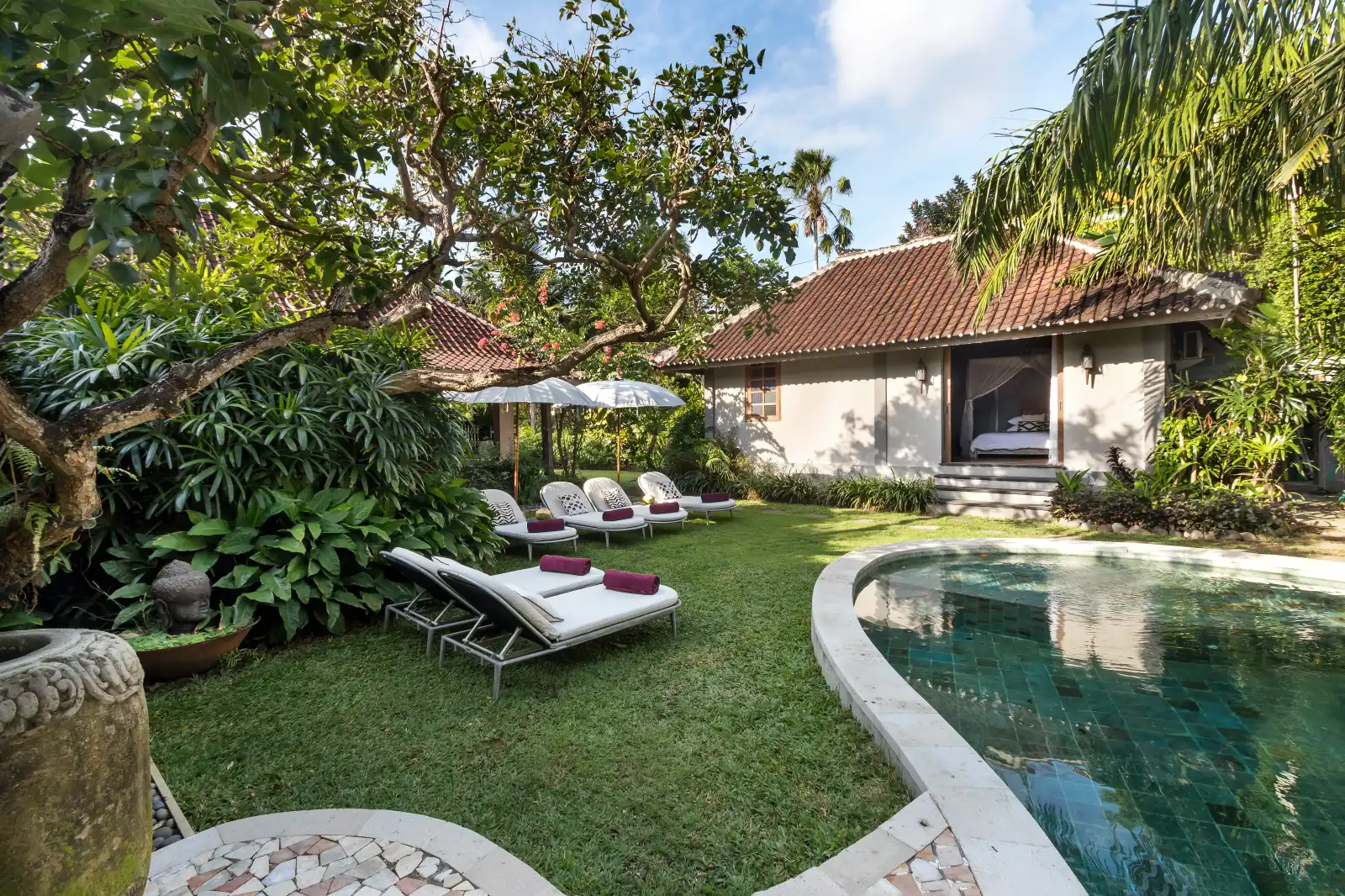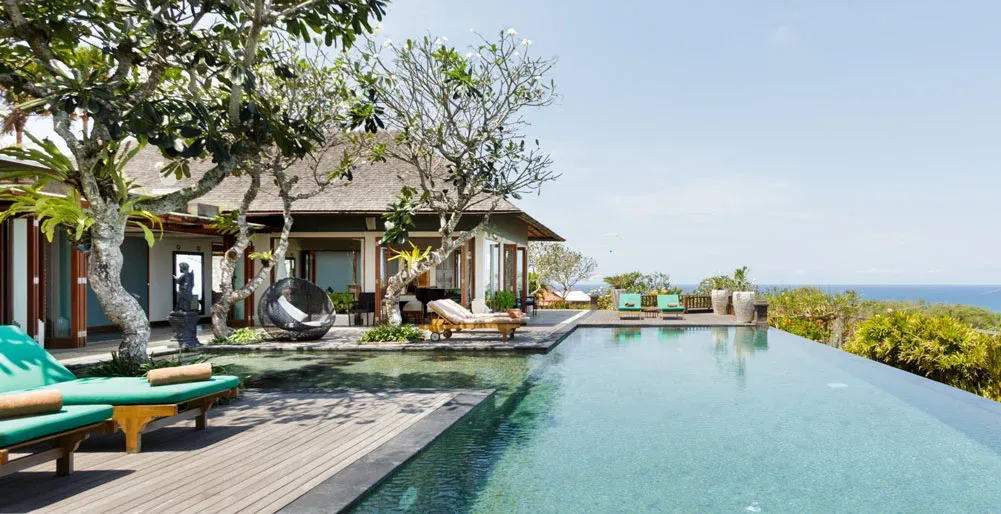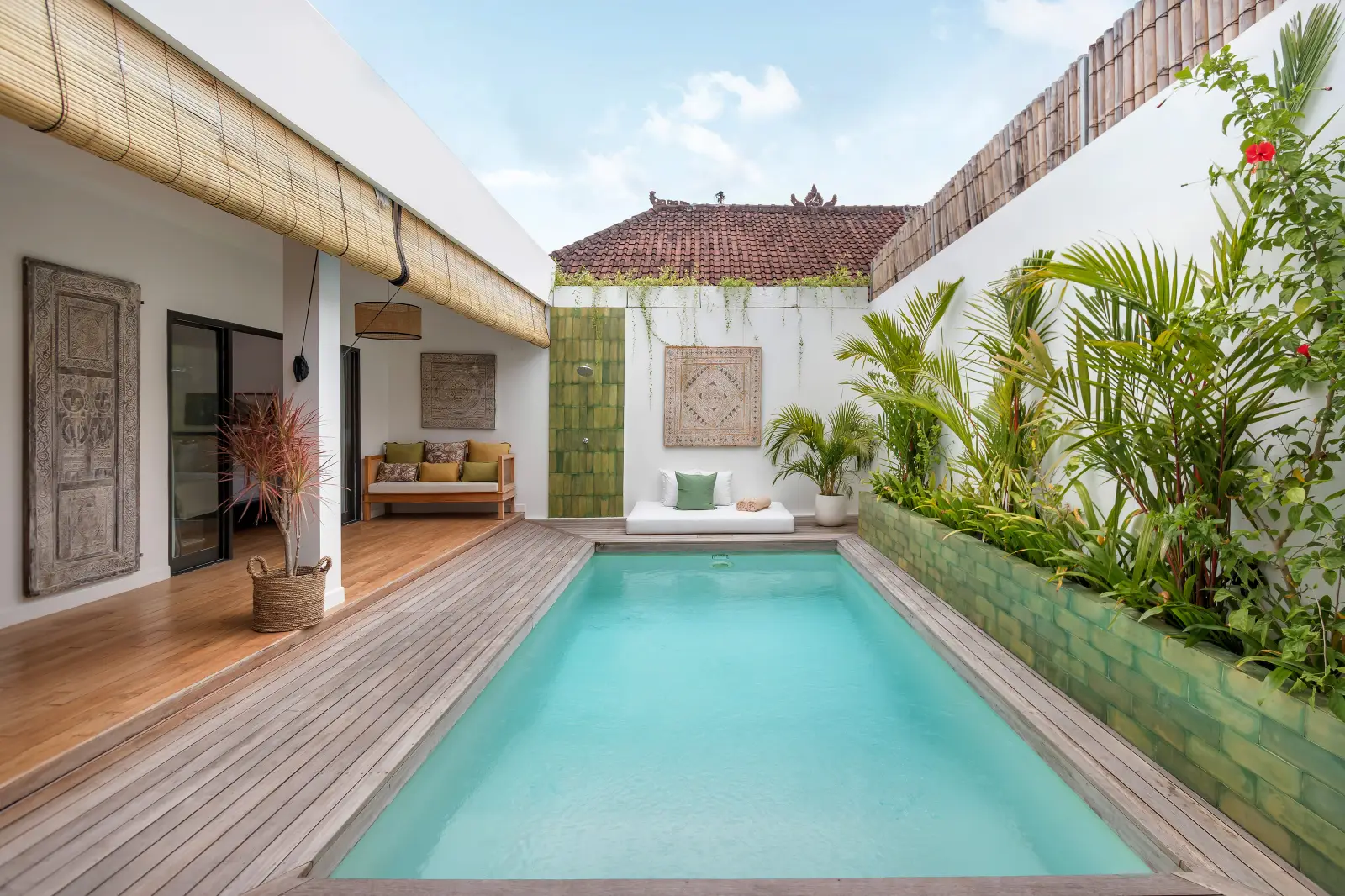Can Foreigners Buy Villas in Bali? Here’s What You Need to Know
Oktarina
September 23, 2025
12 min read

Bali isn’t just one of the world’s most popular travel destinations—it’s also a top choice for many foreigners who want to stay longer, invest, or own a private home in a tropical paradise. With its laid-back lifestyle, stunning natural views, and growing property market, it’s no surprise that many people dream of owning a villa here. But one big question often comes up: can foreigners buy villas in Bali legally and safely?
If you’re considering owning property in Bali, it’s crucial to understand the legal framework from the start. This article will guide you through everything—ownership rules, legal options, and the safest paths to invest. Read it through to the end so you can make informed decisions and avoid costly mistakes.
Can Foreigners Buy Villas in Bali?
Legally speaking, foreigners are not allowed to own land in Indonesia under the “Hak Milik” (freehold ownership) title, which is only available to Indonesian citizens. However, that doesn’t mean you can’t own a villa in Bali. The Indonesian government provides legal paths for foreigners to own or control property—as long as they follow the rules.
Under current land laws, foreigners can acquire property through several legal frameworks. The most common ones include:
- Hak Pakai (Right to Use)
- Hak Guna Bangunan (Right to Build / HGB) via a foreign-owned company (PT PMA)
- Leasehold (long-term rental agreements)
Each option has different terms, requirements, and purposes. Understanding these structures is the first step toward legally owning your dream villa—whether it’s for personal use, long-term investment, or vacation rental income.
Property Ownership Options in Bali for Foreigners

If you want to own a villa legally in Bali, here are the three main legal options to consider. Each one fits a different purpose, so it’s important to choose based on your goals.
1. Hak Pakai (Right to Use)
Hak Pakai allows foreigners to legally use and occupy property in Indonesia, as long as you hold a valid stay permit like a KITAS or KITAP. You can use land owned by the state or individuals (often developers) for private residential purposes.
This right is usually granted for 30 years, and can be extended up to 80 years, provided you meet certain requirements. Keep in mind, not all properties qualify for this scheme—there are minimum price limits and zoning restrictions. Also, the villa must be actively used (not left empty or used solely for business without a license).
2. HGB via PT PMA (Foreign-Owned Company)
If you’re planning to rent out your villa as an investment, the safest and most professional route is to set up a foreign-owned company (PT PMA).
A PT PMA can hold HGB (Right to Build) on land, allowing you to buy land and build or purchase property on it for commercial purposes like a boutique hotel, guesthouse, or villa rental. HGB is valid for 30 years, and extendable up to 80 years under Indonesian law.
This option is popular among foreign investors who want to run accommodation businesses legally. However, it does require full legal compliance, proper capital structure, and regular reporting.
3. Leasehold (Long-Term Rental)
Leasehold allows you to rent property for a long period, usually 25 to 30 years, with the option to extend through a private agreement.
Even though you don’t own the land outright, you can still legally live in, manage, rent out, or renovate the property—as long as it’s clearly stated in the lease contract. This option is flexible and relatively simple, especially because it doesn’t require a company or residence permit.
Many foreigners choose leasehold because it’s faster, easier, and often more affordable upfront. But always make sure your lease contract is clear and legally binding.
General Requirements for Foreigners Buying Villas in Bali

Before you go any further in buying a villa in Bali, you need to understand that the process isn’t as simple as buying property in your home country. There are several legal and administrative requirements that you must meet to ensure the entire transaction is safe, lawful, and aligned with the regulations set by the Indonesian government.
Fulfilling these requirements is crucial to make sure that the ownership or legal rights to your property are officially recognized, and to avoid any future legal issues. Whether you’re buying a villa for personal residence, investment purposes, or to run it as a rental business, you’ll go through the same process.
1. Documents and Licenses You’ll Need
Here are the main documents you’ll need to prepare, depending on the ownership method you choose:
- Right to Use Certificate or Right to Build (HGB)
If you’re purchasing a property under the Right to Use scheme as an individual foreigner, or through a PT PMA (foreign-owned company) for business purposes, you must ensure that the land certificate is properly titled and officially registered with the Indonesian Land Office (BPN). - Lease Agreement (Leasehold)
For long-term lease arrangements, you are required to draft a lease agreement that is notarized by a registered notary or PPAT (Land Deed Official). The contract should clearly define the lease term, extension rights, and rules on renovation or transfer of rights. - OSS Business License (Online Single Submission)
If you plan to rent out your villa legally as a business, you’ll need a business license from the government’s OSS system. This applies to both individual owners and companies (such as PT PMA), and serves as the legal foundation for your business operations. - PBG and SLF (Building Approval and Certificate of Proper Use)
These two documents are essential to confirm that your villa has valid building permits and is deemed safe and suitable for residential or commercial use. PBG (Persetujuan Bangunan Gedung) has now replaced the previous IMB (Building Permit). - NIB & Tourism Business License
If your villa will be used for short- or long-term rentals (e.g., Airbnb), you are legally required to have a NIB (Business Registration Number) and a tourism business license. Without these, your rental operation can be considered illegal.
2. Taxes and Costs You Need to Consider
Aside from paperwork, you also need to account for taxes and other fees that come with buying and owning a property. Below are some of the key financial obligations you should know:
- BPHTB (Land and Building Acquisition Tax)
This is a tax charged when property rights are transferred, such as during a villa purchase. The rate is 5% of the property’s sale value, after subtracting the non-taxable threshold (NPOPTKP). This is typically paid by the buyer. - Final Income Tax (PPh Final)
A 2.5% tax based on the property’s sale price, usually paid by the seller. However, in many cases, this can be negotiated as part of the sale agreement. - VAT (Value Added Tax / PPN)
If you’re buying a villa from a developer registered as a taxable entrepreneur (PKP), you will be subject to 11% VAT. Be sure to confirm this before signing any agreements. - Annual Property Tax (PBB)
As the property owner, you’re responsible for paying annual property tax, which is calculated based on the assessed value of the land and building as stated in the SPPT (Tax Notification Letter). - Income Tax from Rental Revenue
If you plan to rent out your villa, whether on a daily or monthly basis, the income you earn from those rentals is subject to tax. The tax rate and payment method will depend on whether you operate as an individual or under a legal business entity, and whether you’re registered as a taxpayer in Indonesia.
Read more: Recommended Contractor Luxury Villa in Bali to Build Your Dream Home!
Important Things to Check Before Foreigners Buy a Villa in Bali
Buying property in Bali — especially if you’re a foreigner — isn’t something you should take lightly. Beyond meeting legal and administrative requirements, you also need to conduct thorough due diligence on the property’s status and legal documents.
Even small mistakes early on can lead to serious problems later — from losing ownership rights, legal disputes, to significant financial losses. Below are key things you need to check before buying a villa in Bali:
1. Land Status
Make sure the land status is clear and legally valid. Avoid buying land that falls into these categories:
- Green zone land — this type of land is not allowed for residential or commercial accommodation development.
- Undivided inheritance land — this can lead to conflict with other heirs in the future.
- Disputed land — make sure the land is free from any third-party claims or ongoing legal cases.
Always request a copy of the original land certificate and verify its authenticity and current status at the National Land Office (BPN) or through a trusted notary.
2. Zoning Regulations
Not all areas in Bali are legally allowed for villa development or operation. You are only permitted to own property in:
- Residential zones
- Tourism zones
If the property is located in a non-permitted zone, you may face challenges getting the right usage permits, or worse — the villa may be considered in violation of regional zoning laws.
3. Building Legality
Any villa you purchase must have valid building documents, such as:
- PBG (Building Approval) – replaces the old IMB permit and confirms that the building complies with local construction regulations.
- SLF (Certificate of Proper Use) – certifies that the building is safe, functional, and suitable for occupancy.
Without these documents, the building can be considered illegal, making it difficult to obtain business licenses or operate rental activities legally.
4. Avoid the Nominee Scheme
One of the most common mistakes foreigners make is buying property under an Indonesian citizen’s name as a so-called “nominee.” While this may seem like a simple solution, it’s actually very risky and can be illegal.
In many cases, foreigners lose their rights to the property because they are not the legal owner on record. Additionally, if the nominee arrangement is proven to be a form of ownership disguise, the contract can be voided by law, and the property will legally revert to the Indonesian citizen named on the certificate.
5. Make Sure Your Leasehold Contract Is Well-Structured
If you’re choosing the leasehold route (long-term lease), your lease agreement must be clear, detailed, and legally solid. It should outline all rights and responsibilities of both parties. Some essential elements to include:
- Lease duration and extension rights
- Rights to renovate or manage the property
- Terms for transferring the lease to a third party
- Procedures for force majeure or early contract termination
Always work with an experienced notary or PPAT (Land Deed Official) to ensure your contract is legally binding and minimizes potential risks.
Safe Buying Tips for Foreigners Who Want to Purchase a Villa in Bali

Buying a villa in Bali as a foreigner can be a smart and rewarding decision — whether you’re looking for a personal residence, a long-term investment, or a source of rental income. However, because the process involves several legal steps and regulations, it’s important to move carefully and make well-informed decisions. Here are some key tips to help make sure your villa purchase is smooth, legal, and secure:
- Work with a Professional Notary or PPAT (Land Deed Official)
Always involve a licensed notary or PPAT with experience handling property transactions for foreigners. They can help verify land legality, draft or review contracts, and ensure all documentation complies with Indonesian law. - Beware of Cheap Prices Without Legal Documents
Avoid being tempted by properties offered at below-market prices without complete legal paperwork. It’s better to pay a bit more for a property that is fully legal and secure, rather than risk legal trouble or losing your investment. - Consider Setting Up a PT PMA
If your plan includes renting the villa commercially, the safest route is to establish a foreign-owned company (PT PMA). This legal entity allows you to own land under HGB (Right to Build) status and obtain the necessary business and tourism permits to rent the villa legally. - Review Leasehold Contracts Carefully
If you choose the leasehold model (long-term rental), make sure your contract clearly includes: Lease duration and extension options:- Rights for renovation or sub-leasing
- Force majeure clauses (covering unexpected events)
- Always use a notary to make sure the lease agreement is legally binding and enforceable.
- Use an Escrow Account for Safer Transactions
To protect your funds, make your payment through a third-party escrow account. The funds will only be released to the seller after all legal documents are verified and approved, minimizing the risk of fraud. - Work with a Trusted Local Partner
Partnering with a reliable, experienced local expert can make the entire process much easier and safer. One highly recommended option is Bali Premium Villa, a professional team offering full-service support — from legal advice and property acquisition to villa rental management.
Start Your Property Investment in Bali with Bali Premium Villa!
So, can foreigners buy villas in Bali? The answer is: yes, as long as you follow the legal paths recognized by the Indonesian government. While foreigners cannot own land under Hak Milik (freehold title), you can still legally own and manage a villa through schemes such as Right to Use (Hak Pakai), Right to Build (HGB) via a PT PMA, or long-term lease (leasehold). With the right legal process, you can own and manage property in Bali safely, legally, and profitably.
If you’re planning to invest in Bali, now is the perfect time to move forward with the support of the professional team at Bali Premium Villa. We’re ready to guide you through every step — from selecting the right property, checking legal documents, and drafting contracts, to establishing your PT PMA (if needed), and even managing your villa for short- or long-term rentals. With years of experience in Bali’s property and hospitality industry, we understand the needs and expectations of international investors like you.
So, what are you waiting for? Let’s turn your dream into a smart investment. Contact us today and take the first step toward a secure and rewarding property investment in Bali — with Bali Premium Villa by your side.

Related Article

How to Choose Villa Maintenance Service in Bali? Check Here!
Have you made sure that your villa in Bali is...
Have you made sure that your villa in Bali is getting the right maintenance? How to choose villa maintenance service...

The Importance of Preventive Maintenance for Luxury Villas in Bali
Do you know that proper maintenance is key to preserving...
Do you know that proper maintenance is key to preserving the quality of your luxury villa in Bali over the...

7 Interior Elements That Must Be Present in a Luxury Villa in Bali
Have you ever wondered what makes a luxury villa in...
Have you ever wondered what makes a luxury villa in Bali truly stand out in this competitive property market? Interior...
